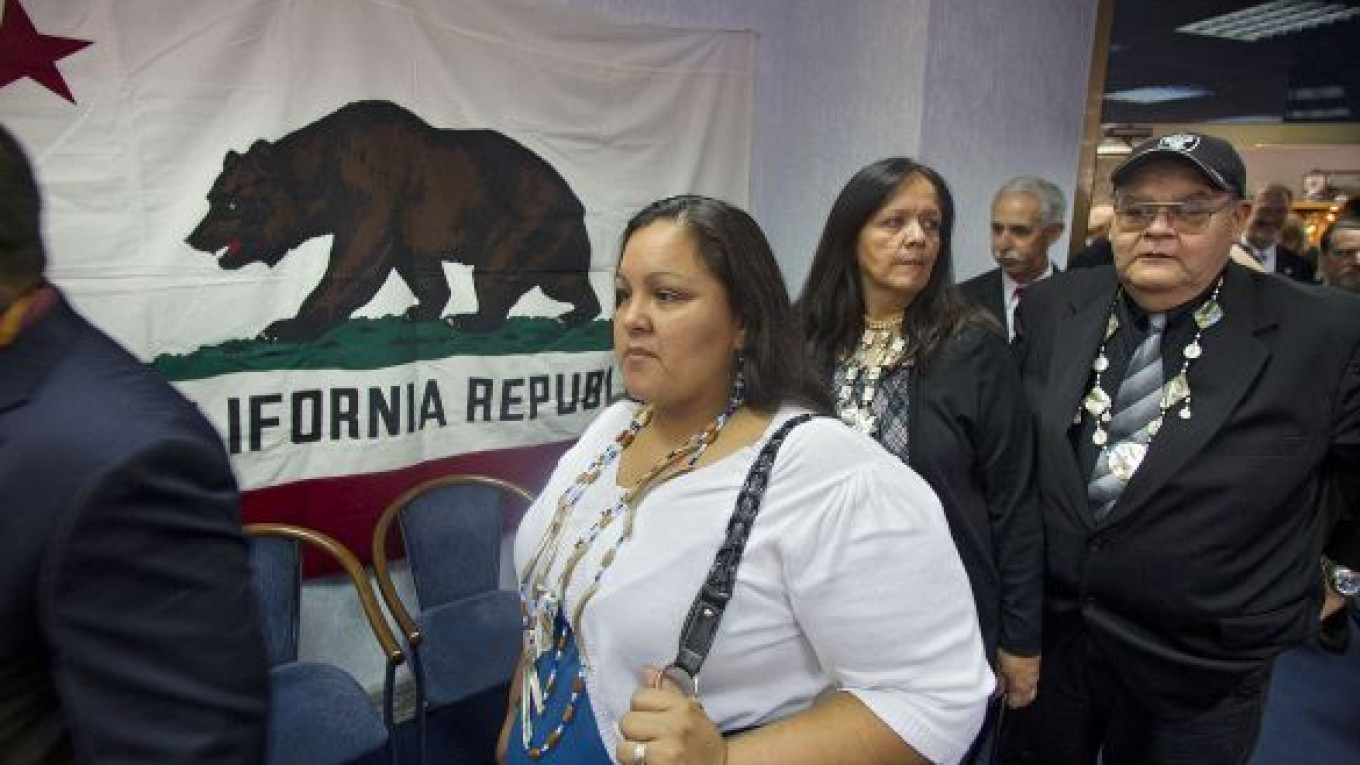An unofficial delegation of U.S. history buffs and Native Americans have marked the 200th anniversary of the founding of Fort Ross, once Russia's southernmost North American colony, with a friendship tour of Russia that included a search for artifacts and long-lost relatives.
The 22-person group, which included Fort Ross conservators, a U.S. park official and seven Kashia Pomo tribespeople, visited St. Petersburg's Kunstkamera museum, where they found baskets, sashes and headdresses that Russian settlers brought back after they abandoned Fort Ross in 1841.
They also visited the small town of Totma, 560 kilometers northeast of Moscow, the birthplace of Ivan Kuskov, who founded Fort Ross 115 kilometers up the coast from San Francisco.
"We came here to make a friendship, to make a pathway of friendship between Russians and the Kashia people. … We share a history, but today we're making history," tribeswoman Martina Morgan said at a roundtable in Moscow on Tuesday.
The Kashia tribespeople described Fort Ross as a rare instance in the history of European colonization in which settlers and natives lived and worked in relative harmony, with Russian otter trappers and farmers mixing peacefully with native Kashia and Coast Miwok.
"They didn't force us to talk Russian. When the English came, they made us speak English. They put us in boarding schools. They were forced to talk English, otherwise they were beaten," said Lester Pinola, the eldest tribal member of the delegation and the only fluent Kashia speaker.
The fort was humble; an 1841 inventory included 24 dwellings and eight bath houses. But its impact on California's history appears to have been significant. Russians built the first windmills and ships in the region, which became a state in 1850, and Russian scientists studied its flora and fauna.
Tragically, the Russians also brought smallpox, which devastated local tribes, but Morgan said it was more important to focus on the positive.
"In any history there's good and bad. If we hold on to the negative, then where will we get? … In the long run, [Fort Ross] is the reason why we still have our religion, our culture, our language. It's something that we hold dear and preserve," she said.
Some Kashia women married Russian men and returned to Russia when the fort was abandoned, sea otter populations having been depleted and crops for Russia's Alaskan settlements outsourced.
The Kashia delegation tried and failed to find relatives on their trip but said they would keep looking.
The tribe is in danger of extinction, chairman Emilio Valencia said. There are only 860 tribespeople left, and just 52 speak the native language. Only a fraction of the tribe live on the 40-acre reservation they call the "rancheria," about a 20-minute drive from Fort Ross.
Valencia said the trip was part of the effort to keep them alive. "We have to leave home to find home," he said, adding that the tribe was looking for investors and hoped to ramp up sales of traditional jewelry.
The tribesmen were dressed in black suits and ties, as well as necklaces made of abalone and shimmering, rainbow clamshells carved into the shape of stars and crescent moons.
"Mine is the circle of life. That's how I feel," said Pinola, who also had with him an Oakland Raiders cap and a matching watch with the American football team's logo.
Robin Joy Wellman, an official at the Fort Ross State Historic Park, said the trip was privately funded. She hoped that the Russian and American governments would fund future programs to raise awareness about Russia's colonial history in North America.
Tuesday's roundtable was organized by the Russian Academy of Sciences, and several Russian researchers helped organize the delegation's trip.
Russia sold Alaska, its last North American territory, to the United States in 1867 for $7.2 million ($120 million, adjusted for inflation).
Related articles:
A Message from The Moscow Times:
Dear readers,
We are facing unprecedented challenges. Russia's Prosecutor General's Office has designated The Moscow Times as an "undesirable" organization, criminalizing our work and putting our staff at risk of prosecution. This follows our earlier unjust labeling as a "foreign agent."
These actions are direct attempts to silence independent journalism in Russia. The authorities claim our work "discredits the decisions of the Russian leadership." We see things differently: we strive to provide accurate, unbiased reporting on Russia.
We, the journalists of The Moscow Times, refuse to be silenced. But to continue our work, we need your help.
Your support, no matter how small, makes a world of difference. If you can, please support us monthly starting from just $2. It's quick to set up, and every contribution makes a significant impact.
By supporting The Moscow Times, you're defending open, independent journalism in the face of repression. Thank you for standing with us.
Remind me later.


